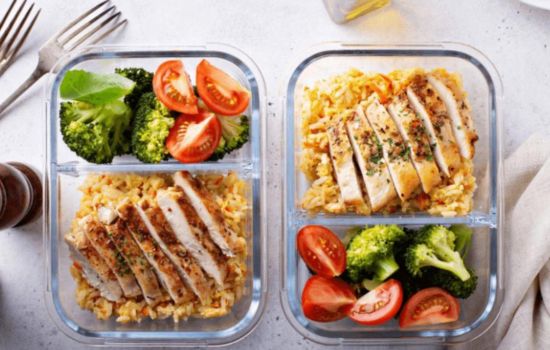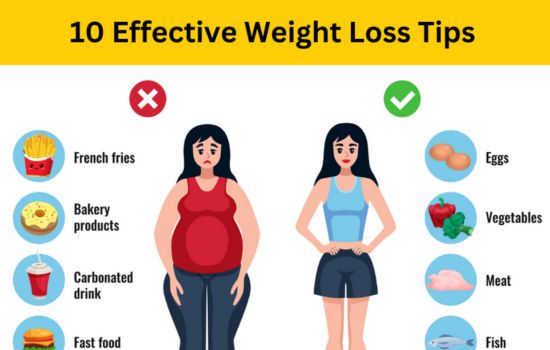Losing weight can be a difficult process, but with the appropriate tactics, it becomes more manageable and sustainable. Whether you want to lose a few pounds or make a big difference these top ten weight loss techniques can help you get there.
Table of Contents
Tips For Weight Reduction:
1. Prioritize whole foods:
Eat full, unprocessed foods including fruits, vegetables, lean proteins, whole grains, and healthy fats. These foods are nutrient-dense, satisfying, and generally lower in calories than processed foods. A diet high in whole foods can help control hunger and offer necessary nutrients.

2. Stay Hydrated
Drinking enough water is essential for losing weight. Thirst might be mistaken for hunger, resulting in unnecessary snacking. Aim for at least 8-10 glasses of water each day. Drinking water before meals can also help with portion control because it makes you feel fuller.
3. Get enough sleep:
Sleep has an important function in weight management. Sleep deprivation can affect hormones that regulate hunger, causing an increase in appetite and cravings. Aim for 7-9 hours of quality sleep per night to help you lose weight.

4. Incorporate regular exercise:
Exercise is vital for burning calories and gaining muscle. Aim for a mix of cardiovascular and strength training workouts. Cardio workouts like running, cycling, or swimming help burn calories, while strength training helps build muscle, which can boost your metabolism.
5. Practice Mindful Eating:
Mindful eating involves paying attention to what and when you eat. It means eating slowly, savoring each bite, and listening to your body’s hunger and fullness cues.
6. Control Portions:
Portion control is key to reducing calorie intake.Be mindful of serving sizes and avoids eating straight from large packages, which can lead to overeating.

7. Limit Added Sugars:
Reduce your consumption of added sugars and processed carbohydrates, which include sugary drinks, candies, white bread, and pasta. These foods can produce blood sugar surges, increasing appetite and cravings. Instead, choose complex carbohydrates such as whole grains, legumes, and veggies.
8. Plan your meals:
Planning your meals ahead of time might help you make healthier choices and avoid eating on impulse. Create a weekly menu, grocery list, and prepare as many meals at home as feasible. This strategy gives you more control over the components and portion levels, which helps with weight management.
9. Stay Consistent:
Consistency is crucial for long-term weight loss. Establishing a routine for meals and exercise can help you stay on track. It’s important to make gradual changes that you can maintain over time rather than opting for drastic measures that are hard to sustain.
10. Seek Support:
Having a support system can significantly improve your weight loss journey. Share your goals with friends and family who can offer support and accountability. Consider joining a support group or consulting with a healthcare expert or nutritionist for tailored advice.
Bonus Tip: Be Patient and Persistent
Weight loss is a gradual process, so set reasonable goals. Celebrate modest triumphs and do not be discouraged by setbacks. Stay focused on your long-term goals and remembers that consistency over time is essential for obtaining and maintaining your ideal weight.
Conclusion:
Weight loss necessitates a combination of nutritious food, frequent physical activity, and lifestyle modifications. By implementing these top ten suggestions into your daily routine, you can develop a long-term plan that encourages weight loss and overall health. Remember, getting healthier is a marathon, not a sprint. Make small improvements, remain dedicated, and enjoy the favorable outcomes.

